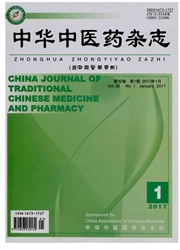

 中文摘要:
中文摘要:
本研究旨在探索rs2107595多态性与中国南方汉族人缺血性中风风痰瘀阻证的发生及血脂水平的关联。方法:纳入缺血性中风风痰瘀阻证患者311例、健康对照组605例,采用Sequenom技术进行基因分型,运用PLINK统计软件进行遗传关联分析。结果:HDAC9基因rs2107595多态性与缺血性中风风痰瘀阻证的关联无统计学意义(均P〉0.05),但是,rs2107595多态性与缺血性中风风痰瘀阻证患者的血清总胆固醇(TC)水平显著关联(加性模型:Padj=0.006;显性模型:Padj=0.003)。结论:GWAS支持的遗传变异rs2107595多态性可能影响缺血性中风风痰瘀阻证的血脂代谢。
 英文摘要:
英文摘要:
Objective: Recently, genome-wide association studies(GWAS) had identified a significant association of rs2107595 polymorphism in HDAC9 gene with the susceptibility of ischemic stroke in Caucasians. This study aimed to explore the association between rs2107595 polymorphism and ischemic stroke patients with syndrome of blockade of wind-phlegm-static blood and their serum lipid level in southern Han Chinese. Methods: A total of 311 ischemic stroke patients with syndrome of blockade of wind-phlegm-static blood and 605 healthy controls were included. Sequenom Mass ARRAY i PLEX was used to type the rs2107595 polymorphism. Genetic association analysis was evaluated by PLINK program. Results: No significant association was found between HDAC9 rs2107595 polymorphism and ischemic stroke patients with syndrome of blockade of wind-phlegmstatic blood(all P〈0.05). However, rs2107595 polymorphism was significantly associated with serum total cholesterol(TC) level in patients with syndrome of blockade of wind-phlegm-static blood(additive model: Padj=0.006; dominant model: Padj=0.003). Conclusion: GWAS-supported variant rs2107595 polymorphism might influence the serum lipid metabolism of ischemic stroke patients with syndrome of blockade of wind-phlegm-static blood.
 同期刊论文项目
同期刊论文项目
 同项目期刊论文
同项目期刊论文
 期刊信息
期刊信息
